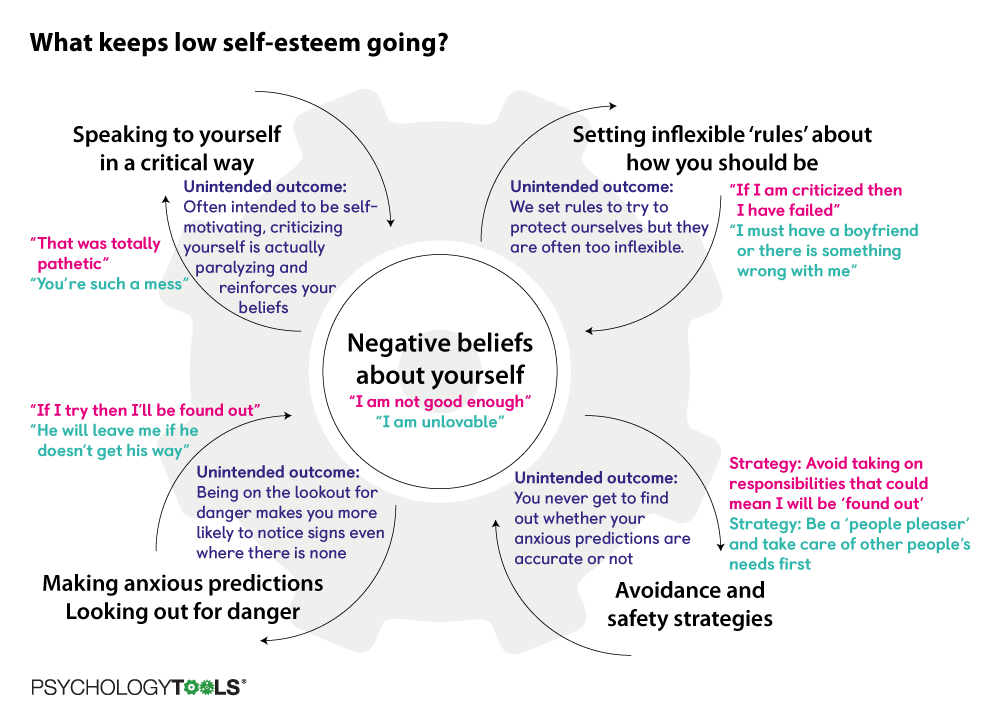I think my friend has bpd
Maintaining Friendships with Someone with BPD
People with Borderline Personality Disorder (BPD) often have a difficult time maintaining friendships because of their tumultuous personalities. But these friendships can offer a source of stability in the midst of emotional turmoil.
Friendships with someone with Borderline Personality Disorder can be emotionally trying on you, so knowing how to handle a friend who has BPD is vital to maintaining an important relationship.
If you are trying to determine whether your friend might have Borderline Personality Disorder, here are some BPD symptoms the National Alliance on Mental Illness (NAMI) suggests looking for:
- Inappropriate, intense, or uncontrolled anger
- Mood swings with periods of intense depression, irritability, and/or anxiety lasting a few hours to a few days
- Impulsiveness
- Recurring suicidal threats or self-injurious behavior
- Unstable, intense personal relationships with extreme, black-and-white views of people and experiences
- Marked, persistent uncertainty about self-image, long-term goals, friendships, and values
- Frantic efforts to avoid abandonment, either real or imagined
Because of their tendency to see things in black and white, people with Borderline Personality Disorder can develop strong and emotional attachments with friends that can shift without warning from idealization to intense dislike. Your friend with BPD may be highly sensitive to rejection and even a sudden change of plans or vacation without including them can make them feel abandoned and cause an extreme reaction.
According to NAMI, your friend with Borderline Personality Disorder’s symptoms are worst when they feel isolated and lacking in social support, and may result in desperate attempts to avoid being alone by acting out through impulsive behavior or suicide attempts.
Being friends with someone with Borderline Personality Disorder can be a challenge and emotionally draining. But understanding the disorder and setting limits can help create a balanced, long-lasting friendship.
Here are some tips for making the friendship work:
- Set limits up front and be consistent with them. Be sure to balance your own needs with the needs of your friend so that you take care of yourself.
- As the friendship grows, communicate how you both can use your strengths to preserve the friendship.
 Create boundaries so that you can get your needs fulfilled.
Create boundaries so that you can get your needs fulfilled. - Be there to listen and sympathize with your friend’s feelings. Even if you disagree you can let them know you understand their feelings. Your friend may be used to people telling them that they are overreacting, so having someone care how they feel without discrediting them can be powerful.
- Find out as much as you can about Borderline Personality Disorder. These friendships can be rocky, so you need to know what to expect and how to understand that their behavior is not intended to harm you.
- Be supportive of your friend if they decide to seek BPD treatment.
- Take threats of self-harm seriously. About 10 percent of people with BPD commit suicide, so take note if you see signs of suicidal behavior.
Maintaining a friendship with someone who has Borderline Personality Disorder can be challenging, but it isn’t impossible.
9 Signs Your Friend Has Borderline Personality Disorder
In your 20s a lot of extreme behavior can seem completely normal — the drinking, the partying, the high-octane emotions and stress. This time of life, characterized by upheaval and change, can make it especially difficult to tell when certain behaviors cross the threshold and become symptoms of mental illness. If a friend has been acting erratically, suffering from mood swings, depression, or impulsive behaviors, they may have borderline personality disorder (BDP).
This time of life, characterized by upheaval and change, can make it especially difficult to tell when certain behaviors cross the threshold and become symptoms of mental illness. If a friend has been acting erratically, suffering from mood swings, depression, or impulsive behaviors, they may have borderline personality disorder (BDP).
This illness, first listed in the Diagnostic and Statistical Manual for Mental Disorders, Third Edition (DSM-III) in the 1980s, is surprisingly common. It affects 5.9 percent of adults (approximately 14 million people) in the US, with three million cases reported each year — and the number of diagnosis seem to be growing.
Unfortunately, the name "borderline personality disorder" is a bit of a misnomer (what is this border that the personality is crossing anyway?). BPD, which is marked by unstable moods, behavior, and relationships, can be extremely hard to pinpoint. It usually develops during adolescence or early adulthood (around age 18 through 25), and has been misunderstood and under-diagnosed. It is often confused with bipolar disorder as both conditions are characterized by unstable moods. However, with BPD mood changes happen in shorter intervals than bipolar disorder — a few hours or days, versus weeks and months.
It is often confused with bipolar disorder as both conditions are characterized by unstable moods. However, with BPD mood changes happen in shorter intervals than bipolar disorder — a few hours or days, versus weeks and months.
Around 85 percent of people with borderline personality have other issues which may complicate the diagnosis and treatment. According to the National Education Alliance, women with BPD may also suffer from chronic depression, anxiety, or eating disorders, whereas men are more likely to have antisocial personality disorder, and substance abuse is a common issue overall.
Harriet Williamson, a 24-year-old mental health ambassador, described in a video for the BBC what it is like to live with BPD: “Sometimes it feels like I’m on an emotional rollercoaster that I can’t get off.” The intensity of the negative feelings can be very frightening, she says, and that additionally, “fear of judgement is very, very real. You have to choose the people that you tell carefully. ” If you have a friend who may be suffering from the disorder, their symptoms will affect you too. Discussing mental illness may seem taboo, and as a society we are still fighting the stigmas attached, but it’s important if possible to encourage them to take steps towards treatment.
” If you have a friend who may be suffering from the disorder, their symptoms will affect you too. Discussing mental illness may seem taboo, and as a society we are still fighting the stigmas attached, but it’s important if possible to encourage them to take steps towards treatment.
Dialectical Behavior Therapy (DBT) which relies on teaching skills to control intense emotions and reduce destructive behavior, and incorporates zen and mindfulness practices, is considered the best treatment option at the moment. BPD is difficult to treat as it manifests on an interpersonal level, affecting how one sees the world and themselves. Medications can be used to treat concurrent biological issues, but no medications have been approved by the U.S. FDA to treat BPD alone.
If you suspect a friend may be dealing with this, check out the list of symptoms below. If you notice that their pattern of behavior matches five or more of these criteria from the DSM-5 they may have BPD.
1.
 Fear of Abandonment
Fear of AbandonmentDrastic reactions to real or imagined abandonment is characteristic of people dealing with BPD. They may be panicky or depressed over the smallest instances of separation such as business trips or vacations.
2. Unstable Interpersonal Relationships
A person with BPD will have very intense and fraught relationships with their family, friends, and loved ones. They are prone to "splitting" — thinking in extremes (someone is either "all good" or "all bad"). Sometimes if you are hanging out with this friend, you may feel like you are walking on eggshells even when you are having a good time. If you have a friend who is frequently changing between idealization ("You're my best friend! I love you!") and devaluation ("You're a b**ch. I hate you!") that may be a warning sign.
3. Unstable Self-Image Or Sense Of Self
People with BPD may not see themselves clearly. They may have career goals and life plans that are always changing, and at the same time will criticize themselves excessively for it. Many people suffer from low self esteem and need time to "figure themselves out," but this is also very common in people with BPD.
Many people suffer from low self esteem and need time to "figure themselves out," but this is also very common in people with BPD.
4. Impulsive Behaviors
Does your friend make spur of the moment decisions or engage in risky behaviors without thing of the consequences? An impulsive friend can seem fun, and bring you on wild adventures, but if their spending, drinking, and sexy times get out of control it can be dangerous for everyone.
5. Suicidal Behavior Or Threats Of Self-Harm
If your friend threatens or shows signs of self-harm (such as cutting), they should get immediate help. According to the National Institute of Mental Health, "as many as 80 percent of people with BPD have suicidal behaviors."
6. Unstable And Highly Reactive Mood
If a friend is experiencing intense feelings of anxiety or irritability that last from a few hours to a few days it could be more than just worrying about that big presentation at work. Ask yourself: when things get stressful between your friend and another person do they get panicky and tense? Are they frequently fearful of uncertainty, of losing control? Do they spend time worrying about the past or obsessing about possible problems in the future? Many people suffer from anxiety, but if you answered yes to most of these, it may be a sign of BPD.
7. Chronic Feelings Of Emptiness Or Boredom
This goes way beyond "home on a Saturday night and there's nothing on TV" boredom. These feelings can manifest in many different ways. It doesn't have to be a Camus style ennui — your friend can also feel a nagging emptiness akin to that they don't know who they are or what they're meant to do with their lives.
8. Intense Or Inappropriate Flaring Up Of Anger
Intense emotions like anger can be overwhelming and sudden in someone with BPD. Even a seemingly small thing can trigger yelling, or even physical fights. Don't write these off as a bad temper or PMS too quickly.
9. Stress-Related Paranoid Thoughts Or Dissociative Symptoms
"If I'm experiencing a severe episode, I can lose touch with reality in a way, and I don't feel in control of what I'm doing at all. And those periods are very frightening," Harriet Williamson described to the BBC. If a friend describes moments of feeling cut off from her body, removed from her actions, or observing herself from outside her body this could be a clear sign of BPD.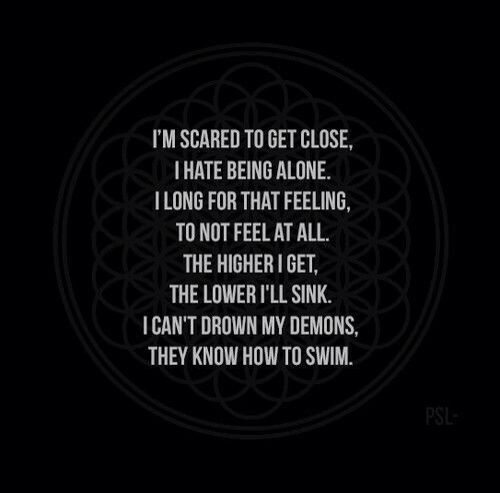
If your friend's actions align with these symptoms you should encourage them to seek help. Dr. Carol W. Berman, assistant clinical professor of psychiatry at NYU Medical Center, writes in the Huffington Post, that when dealing with a friend who may have BPD, "The most important tool is not to internalize the person's behavior, or take it too personally. Remember it's not about you. People with borderline personality disorder aren't fully aware of their behavior and the effect on other people." To be a good friend you have to protect yourself and your emotions. Just because you set boundaries with your friend, doesn't mean that you can't still be sympathetic and support them going forward.
Images: neill_kumar/Unsplash, Cayton_Heath/Unsplash, David_Marcu/Unsplash, Abigail_Keenan/Unsplash, Volkan_Omez/Unsplash, Benjamin_Combs/Unsplash, Christopher_Campbell/Unsplash
Borderline personality disorder: symptoms, treatment, communication tips
- What is it
- Test
- Symptoms
- Causes and risk factors
- Is it being treated
- How to communicate with a person with BPD
- Expert commentary
What is borderline personality disorder
Borderline personality disorder (BPD) inevitably affects how a person thinks and feels, how he interacts with others [1]. The diagnosis is recorded in the ICD-10 and is considered a subspecies of an emotionally unstable personality disorder. The disorder manifests itself in problems with self-esteem, the management of emotions and behavior, high anxiety and desocialization, and leads to unstable relationships with others. With borderline personality disorder, a person experiences a fear of being alone or abandoned. Misplaced anger, impulsiveness, frequent mood swings can alienate potential partners. nine0021
The diagnosis is recorded in the ICD-10 and is considered a subspecies of an emotionally unstable personality disorder. The disorder manifests itself in problems with self-esteem, the management of emotions and behavior, high anxiety and desocialization, and leads to unstable relationships with others. With borderline personality disorder, a person experiences a fear of being alone or abandoned. Misplaced anger, impulsiveness, frequent mood swings can alienate potential partners. nine0021
Advertising on RBC www.adv.rbc.ru
Deviations are usually recorded in young people and may worsen with age. However, many patients diagnosed with BPD are able to live a full life, having worked through the main problems.
Borderline Personality Disorder Test
Some of the symptoms may point directly to BPD, but only the attending physician will give exact information. If you suspect you have a disorder, answer a few questions:
- Do you have a fear of being alone that makes you act inappropriately? For example, constantly call a partner, try to be always near him.

- Have you had to change your mind drastically in relation to your partner, to move from love to hatred for no particular reason?
- Have you ever felt that you do not have a clear idea of yourself, that you are not sure of your self-worth?
- Have you committed impulsive dangerous acts? For example, have you taken drugs, spent large sums of money recklessly, or had unprotected sex? nine0004
- Have you harmed yourself, threatened suicide in the presence of loved ones?
- Do you experience severe mood swings, from anxiety and irritability to days of depression and apathy?
- Do you find it difficult to control your anger?
- When you find yourself in a stressful situation, do you feel as if you are disconnected from reality and your own body, do not control your thoughts and behavior?
If you answered "yes" to more questions, it makes sense to talk to a psychotherapist. Symptoms do not always point to borderline personality disorder and may be due to other health problems. Only a specialist can make a correct diagnosis and give competent advice. nine0021
Only a specialist can make a correct diagnosis and give competent advice. nine0021
© Yuris Alhumaydy/Unsplash
Symptoms of borderline personality disorder
BPD affects how a person relates to himself and others, and how he behaves in society. Signs and symptoms vary, there may be several or just a couple from the list [2]:
- Strong fear of being abandoned. A person is ready to go to extreme measures to avoid the real or imagined withdrawal or rejection of a partner.
- Tendency to unstable relationships. For example, a person idealizes a partner, but at some point suddenly decides that the latter is cruel and unfair. nine0004
- Rapid changes in self-identification and self-esteem. Goals and values switch disproportionately to the circumstances - abruptly and for no particular reason. A person tends to consider himself bad, he needs impulses from the outside in order to feel alive and needed.
- Stress related paranoia. Loss of contact with reality lasting from several minutes to several hours.

- Impulsive behavior, propensity to take risks. Gambling, reckless driving, unsafe sex, alcohol abuse, overeating, drugs. nine0004
- Success sabotage. Sudden unreasonable rejection of positive relationships, good work.
- Self-mutilation, suicidal tendencies. Often occur in response to separation anxiety or partner rejection.
- Sudden mood swings lasting from several hours to several days. Bright, hypertrophied emotions: happiness, anxiety, shame and irritability.
- Constantly accompanying feeling of emptiness, lack of interest in what is happening. nine0004
- Aggression - strong anger, cruel sarcastic remarks to interlocutors, fights.
Causes and risk factors
As with other mental health problems, the causes of borderline personality disorder are not fully understood. In addition to circumstances such as childhood abuse or neglect, borderline personality disorder may be associated with the following factors.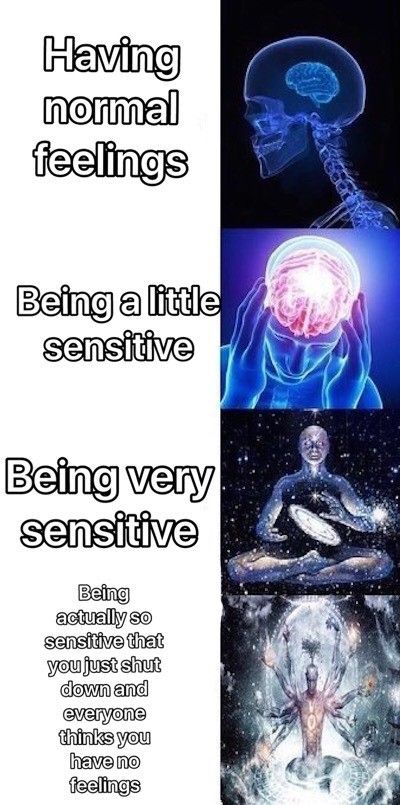
- Genetics. Studies involving twins and their relatives suggest that BPD may be inherited and be part of a mental health complex [3]. nine0004
- Anomalies of the brain. Several studies have confirmed changes in certain parts of the brain involved in the regulation of emotions, especially impulsivity and aggression [4]. Patients with BPD may have malfunctions in the regulation of chemicals, such as the production of serotonin, which affects mood.
Is there a cure for borderline personality disorder
BPD is difficult to treat. But with the help of modern, evidence-based therapies, people with the disorder can be helped to manage their symptoms and improve their quality of life. It is good if the treatment is carried out by a licensed doctor who specializes in this disease. Sometimes the patient will need to interact not only with a psychiatrist, but also with a social worker who will help to adapt in the absence of loved ones. nine0021
The doctor usually conducts an interview and discusses the person's symptoms. Then there is a thorough medical examination and testing, which allows you to exclude other diseases. Comorbid disorders can make BPD difficult to diagnose and treat, especially if their symptoms overlap. For example, a person may show signs of depression, bipolar disorder, anxiety, substance use problems, or eating disorders. If a patient with borderline personality disorder does not receive proper treatment, they are more likely to develop chronic illnesses. And not only mentally, but also physically - patients with BPD tend to make choices in favor of an unhealthy lifestyle and self-harm. nine0021
Then there is a thorough medical examination and testing, which allows you to exclude other diseases. Comorbid disorders can make BPD difficult to diagnose and treat, especially if their symptoms overlap. For example, a person may show signs of depression, bipolar disorder, anxiety, substance use problems, or eating disorders. If a patient with borderline personality disorder does not receive proper treatment, they are more likely to develop chronic illnesses. And not only mentally, but also physically - patients with BPD tend to make choices in favor of an unhealthy lifestyle and self-harm. nine0021
Psychotherapy is the first line of treatment for a person with BPD. It can take place both individually and in a group. The second option helps the patient to interact with other people and express himself in society. Most often, the doctor uses one of two therapy options, or combines them:
- Dialectical Behavioral Therapy (DBT). It uses the concepts of awareness and acceptance of the current situation and emotional state.
 DBT also teaches skills to control and reduce self-destructive behavior. nine0004
DBT also teaches skills to control and reduce self-destructive behavior. nine0004 - Cognitive behavioral therapy (CBT). This type of assistance allows you to identify and change the core beliefs that underlie inaccurate acceptance of yourself and others, as well as problems associated with communication.
Because their benefits are unclear, medications are not commonly used as the primary treatment for borderline personality disorder. However, in some cases, a psychiatrist may recommend medications to treat certain symptoms, such as controlling mood swings and depression. The psychotherapist should specialize in borderline personality disorder, that is, receive additional education in this area. nine0021
How to communicate with a person with BPD
People with BPD are often very suspicious and vulnerable. They need support, and it is important for them to realize that they have someone to turn to in case of exacerbations. Eliza Gordezki, a writer, artist and queer feminist with BPD, has developed a manual for interacting with people who have been diagnosed with BPD [5]. Here are the main recommendations.
Here are the main recommendations.
Tell loved ones that you will take care of them
People with BPD tend to think that if they do not hear this confirmation, then others around them are indifferent. Suitable phrases:
- "Just writing to you to tell you I care about you."
- "I wanted you to know that I'm thinking of you right now."
- "I really like having you in my life and I wanted to make sure you knew that."
Take an interest in well-being and affairs
For people with BPD, this is a vicious circle: they are afraid of being rejected, so they do not share their experiences in order to eliminate the risks of negative reactions from others. Asking how you are doing is a good strategy for making contact. nine0021
- “Hi, how are you?”
- “I saw you posted a sad post on Facebook. I wanted to make sure you were okay."
Soften bad news with support and sympathy
When you tell your loved one some unpleasant information, try to remind him that he is important to you and that you will support him in any case. A person with BPD needs to be aware that his feelings are taken into account and not perceived as something feigned.
A person with BPD needs to be aware that his feelings are taken into account and not perceived as something feigned.
- "It's not easy for me to support you in this crisis, but I need to know what to do to make it easier for you to deal with it."
Match words
Marsha Linehan, who developed the Dialectical Behavior Model (one of the most common treatments for people with BPD), uses specific vocabulary in her manuals [6]. Rather than characterize a person or their actions with judgmental words, she prefers adjectives such as "efficient, skillful, and wise" (or the reverse, "inefficient, inept, and unwise"). These words separate a person from his behavior, they name qualities that can be changed. If someone is being violent, negative, or insulting, you can say something like:
- “I can see you're upset. I understand why you are upset, but these actions are very inefficient and will not bring you the desired results. Let's think together how we can achieve greater sense and achieve the desired prospects.

Compare this phrase with those that many people are used to using in similar situations: “It's not normal if you react like that!”, “It's impossible to communicate with you, there is too much drama”, “Why are you overreacting? You are always so sensitive!” nine0021
© Pavel Danilyuk/Pexels
Be attentive to triggers
The only way to determine what is bothering a loved one is to ask and observe. Among people with BPD, two triggers are common (eng. trigger - a reason, a trigger; in psychology - an irritant that causes a certain reaction) - to be thrown and to be rejected. Simple situations that most people are used to can cause a strong negative reaction with borderline personality disorder. For example, if you reschedule a meeting or began to devote more time to other things, did not respond to a message for a long time, or forgot to call. Of course, changing plans is normal, but when communicating with a person with BPD, it is worth taking a little time to explain your actions to him:
- “I remember that we planned to meet on Friday and have dinner together, and I'm sorry, but I have to cancel this meeting.
 I was assigned to make an urgent report, and I will be at work all evening. It will be great if, along with the cancellation of plans, you offer a quick alternative: “But I really want to spend time with you! Maybe we can meet on Saturday for lunch?
I was assigned to make an urgent report, and I will be at work all evening. It will be great if, along with the cancellation of plans, you offer a quick alternative: “But I really want to spend time with you! Maybe we can meet on Saturday for lunch?
Repeat and confirm
People with BPD need to be reminded of your positive attitude. Frequent reinforcement and support is an important part of their well-being and confidence in the world. Be patient and focus on good moments, convince your loved one if he breaks into negative emotions, even if it seems to you that they are unreasonable. For example, your friend is upset that they don't reply to a message. At this point, he may seriously believe that the interlocutor hates him. Inform that this is not the case, most likely, the person is just busy, he will definitely write or call as soon as he has time. nine0021
What works well for one person may not work for another, so it's always best to talk to your loved ones and ask what they need.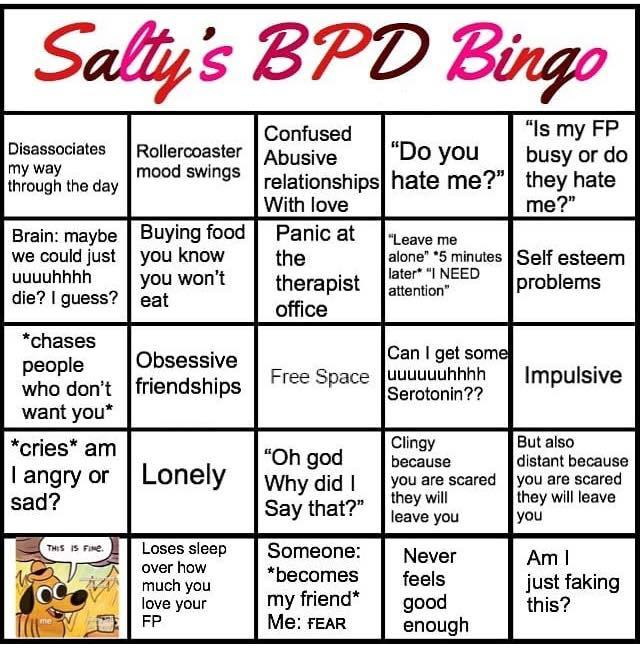
Expert comment
Andrey Yudin, psychologist, Gestalt therapist, co-founder of Stemning Gestalt Center
It is not always possible to build relationships with a person with BPD [7]. But if it's not a destructive abusive relationship and it's important for you to keep the relationship going, you need to put in a lot of effort. First of all, set boundaries - when you can come or call, whether you can shout. Sometimes it can take years to rebuild, especially when it comes to older relatives. It will take a lot of labor and therapeutic support. nine0021
Borderline personality disorder is one of the three basic personality disorders in modern psychotherapy, the other two being schizoid and narcissistic. BPD is the most well studied and isolated, it is in the public eye due to its clinical manifestations. The disorder is included in the ICD-10, but the difficulty lies in the lack of uniform criteria for the diagnosis. There are three obvious signs of borderline personality disorder:
- The person does not take care of himself.
 For example, he does not visit doctors, while experiencing guilt and shame for his choice. This factor applies to both hygiene and personal relationships. nine0004
For example, he does not visit doctors, while experiencing guilt and shame for his choice. This factor applies to both hygiene and personal relationships. nine0004 - Approach speed. People with BPD tend to quickly make contacts and just as quickly become disillusioned with new acquaintances, friends, and romantic relationships.
- Extreme fear of rejection. If a person is afraid of being abandoned, being rejected by relatives, friends or partners, then this is a clear sign of BPD.
In BPD, there is a clear lack of self-activation - inducing oneself to some kind of action. At the same time, it is difficult for a person to explain to himself why he cannot do this. Trying to rouse himself to action, he begins to worry. Borderline personality disorder begins in childhood, between 16 and 24 months. It is often the result of severe abuse, physical, emotional or sexual abuse, or a parent's negative response to a child's need for emotional closeness. In the case of premature separation, a mental structure is formed from two separate parts, which normally should be integrated into each other, but in BPD these are two separate modules.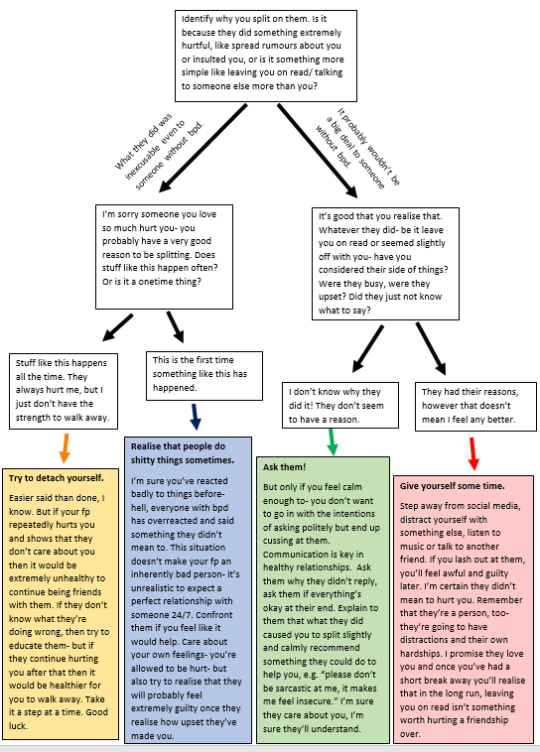 nine0021
nine0021
BPD is often associated with drug addiction. Suffering, feelings of frustration, dissatisfaction encourage a person to chemically regulate his emotional state. This is alcohol, and drugs, and self-damaging behavior, and not only in relation to the body. For example, a person can spend all the money on payday.
With regard to BPD during adolescence, for this stage of human development, many of the "symptoms" are actually normal behavior. Severe emotional experiences, dulling the sense of self-preservation, experiments with substances and partners. But from the age of 16-18, when the transitional stage has been passed, the persistence of these signs may be a reason to contact a specialist. nine0021
Those close to people with BPD face, first of all, their emotional instability. The biggest difficulty is the chaotic influence on the lives of others. If a person with a narcissistic disorder extends his suspiciousness to the assessments of others, then with BPD people tend to have a different focus - love / not love, rejection / acceptance.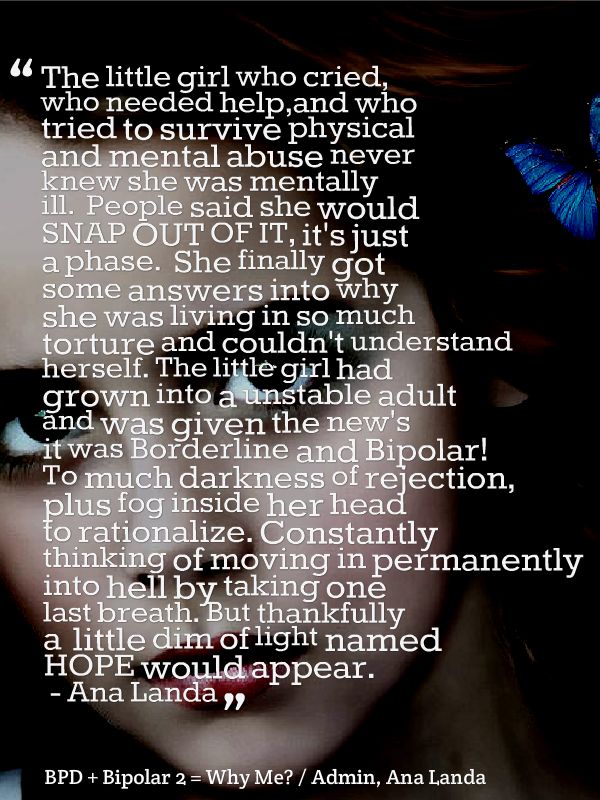 A person may try to return the location of the partner or play ahead of the curve - break off the relationship, if he assumes that he may be abandoned. People with BPD may become abusers because of the unbearable emotional experiences they are trying to change in this way. nine0021
A person may try to return the location of the partner or play ahead of the curve - break off the relationship, if he assumes that he may be abandoned. People with BPD may become abusers because of the unbearable emotional experiences they are trying to change in this way. nine0021
In the professional field, BPD can be suspected, for example, in rock stars. Moreover, the presence of such a feature for people in this profession will even be a plus. There will be a lot of life and pain in their work, it is very sincere and can be healing for other people.
If you encounter a person with BPD at work—a boss, a colleague, a subordinate—they are likely to have fairly loose boundaries because they find it difficult to set and maintain them. This may be a person who perfidiously treats other people's borders or, conversely, distances himself and avoids communication. People with BPD are very successful. Such bosses have reactive behavior, chaos in the department, and many will be uncomfortable. But there are qualities in BPD that are good for management: empathy, intuition, even being aggressive can be an asset for career advancement. nine0021
But there are qualities in BPD that are good for management: empathy, intuition, even being aggressive can be an asset for career advancement. nine0021
The diagnosis and treatment of borderline personality disorder requires a specific set of skills that are not taught in psychology departments, at least not in basic education programs. Most psychologists do not have such qualifications; a maximum of 10% of practicing specialists have it. Therefore, educational work is especially important so that people can find the understanding and support that are so needed. The peculiarity of therapy for BPD will be directed to the very two modules of consciousness (patterns) of the patient. A person with BPD may go to the doctor from their positive childhood pattern and talk about how well the treatment is working. He does this because he is used to being held in relationships in this way, he has learned that he must give positive emotional nourishment "so as not to be abandoned." The therapist must frustrate this pattern, help to go beyond it. At the other extreme, a person with BPD goes into denial, gets angry, behaves aggressively. It is important that the doctor is able to recognize these signs. nine0021
At the other extreme, a person with BPD goes into denial, gets angry, behaves aggressively. It is important that the doctor is able to recognize these signs. nine0021
Any effective therapy for BPD is a progression along the spectrum towards normal functioning. The prognosis of treatment is quite positive, it is wrong to call BPD an incurable lifelong disorder, as was believed in past years. Much has changed, and in almost all cases, if a person has access to therapy and is willing to work, most of the symptoms can be eliminated within 2-4 years. With narcissism, successful therapy takes 5-7 years.
Living with borderline personality disorder
Daria Batyrshina
lives with BPD
Author profile
I could not get a correct diagnosis for several years, and then it completely changed my life.
To describe borderline personality disorder, or BPD, psychologist Marsha Linehan's well-known statement is perfect: “These people simply don't have 'emotional skin'. Even the slightest touch or movement can cause the most severe suffering.”
Even the slightest touch or movement can cause the most severe suffering.”
Share my path to getting the right diagnosis, symptoms, and tips for dealing with people with BPD. nine0021
See a doctor
Our articles are written with love for evidence-based medicine. We refer to authoritative sources and go to doctors with a good reputation for comments. But remember: the responsibility for your health lies with you and your doctor. We don't write prescriptions, we make recommendations. Relying on our point of view or not is up to you.
What is Borderline Personality Disorder
Borderline Personality Disorder is characterized by permanent changes in mood, self-image and behavior. This can lead to problems in relationships with other people and impulsive actions of all kinds. nine0021
BPD - Mayo Clinic
BPD - National Institute of Mental Health, USA
In the International Classification of Diseases 10th Revision, or ICD-10, there is in fact no diagnosis of "borderline personality disorder", there is an emotionally unstable personality disorder, which two types: borderline and impulsive. In ICD-11, this is already a separate diagnosis, which is called borderline personality disorder.
In ICD-11, this is already a separate diagnosis, which is called borderline personality disorder.
The disorder has several main features. nine0021
So what? 01/12/22
Transition to the new International Classification of Diseases has begun in Russia: what will change and when
Self-injurious and risky behavior. For example, a person may injure themselves or use psychoactive substances - borderline disorder increases the risk of developing various addictions.
Black and white thinking: it seems to a person that there can only be good and bad, there are no halftones.
BPD Diagnostic Criteria - Medscape
Problems with self-esteem. People with this disorder are overly sensitive to the opinions of others, enter into dependent relationships, have a strong fear of being alone, and may take desperate actions to keep a loved one or get their attention.
The manifestations of borderline personality disorder are similar to those of adolescence: outbursts of anger, mood swings, aloofness, so this diagnosis is made after 18 years.
What are the symptoms of borderline personality disorder
Alexey Pribytkov
psychotherapist, psychiatrist, Ph.D.
 For example, the partner did not respond to the message.
For example, the partner did not respond to the message. Why borderline personality disorder occurs
Why borderline personality disorder develops is not exactly known.
NHS
Biological factors. There is evidence that the development of personality disorders, including BPD, may depend on genetic factors. nine0021
BPD may also be associated with changes in some parts of the brain responsible for controlling emotions. Its development can be affected by disturbances in the functioning of the system of neurotransmitters - compounds with the help of which brain neurons communicate with each other, in particular serotonin.
Social factors. For example, unstable relationships with significant adults, lack of love in childhood, neglect by parents, loss of a loved one.
Emotional or physical abuse, as well as intense fear experienced in childhood, greatly increase the risk of any psychological problems. In this case, BPD can be combined with another diagnosis - post-traumatic stress disorder, or PTSD. It is manifested by constant frightening memories of a traumatic event and increased anxiety. The more unstable the environment around and the more traumatized the child, the more likely it is to get PTSD. nine0021
How I treated depression and anxiety for several years
I first saw a doctor almost eight years ago. I had an eating disorder - it often accompanies BPD, but I didn't know about it yet.
My gastroenterologist at some point realized that my constant pain in the abdomen was most likely connected not with physical problems, but with mental ones. My mother took me to a government clinic, where I came across incompetent doctors.
/eating-disorders/
How to cure eating disorders
The psychiatrist said that I have anorexia, I look terrible and I won't be able to find a partner because "men don't throw bones." Then I realized that it was not worth waiting for help from him.
I coped with eating disorders myself, having lived through all the stages from anorexia to bulimia and compulsive overeating in two years. After solving the problem with food, depression came. Here, I couldn't manage on my own.
My days were similar to each other: constant fatigue, apathy, I didn’t have enough strength even to eat and brush my teeth, and there was only fog in my head and no thoughts. My circle of contacts narrowed greatly, because those around me saw only aggression or received no answers at all. So several years passed, then I realized that I needed help. nine0021
On the Profi-ru website, I found a psychologist who lived next to me. Then I did not yet know how psychiatrists differ from psychologists and psychotherapists, so I did not receive the necessary help.
/psychotherapy-search/
How to choose a psychotherapist
Psychologists usually do not work with mental disorders, besides, in the sessions I just told what was bothering me, there was no other support. Sometimes I couldn't find words and we just kept silent.
I went to the specialist for about a month and paid 1300 R for each meeting. In total, we held nine meetings. The only thing I got was the fog left my head. Despite my condition and the fact that the psychologist could not do anything about it, she persuaded me to stay in therapy. She said that it helps, although I did not feel any relief.
11,700 R
I spent on a psychologist who did not help me
As a result, I did not want to spend more money on myself and lost confidence in doctors. Then I learned that in Moscow you can get free psychological help at the Moscow Service for Psychological Assistance to the Population. nine0021
nine0021
Moscow Service for Psychological Assistance to the Population
I had to wait for an appointment, but I had nowhere to hurry. About six months later, I was able to get to a psychologist. I told her what worries me - at that time they were symptoms of depression and apathy. She immediately said that I should talk to a psychotherapist, and I made an appointment with another specialist in the same clinic.
The psychotherapist referred me to a psychiatrist, suggesting several doctors she trusts. She said that I most likely had depression and needed medication. Psychiatrists are not accepted at MSPPN, so I went to a private clinic, where I had to pay 4000 R for an appointment.
The amount of free assistance in the ISPP is limited, but it is enough to get started. Source: MSPPN A psychiatrist in a private clinic diagnosed me with depression, prescribed an antidepressant and a tranquilizer. I was lucky that my doctor saw not only in a private clinic, but also in a state one, so I went to all subsequent appointments for free.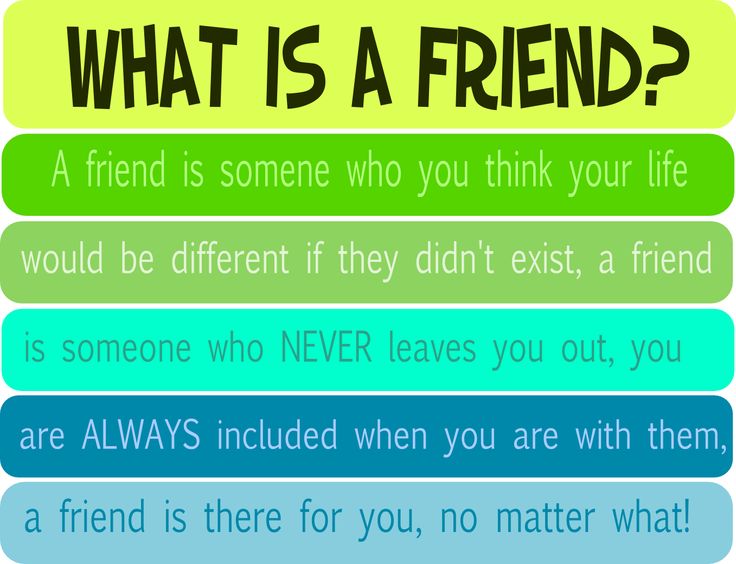
The second time I managed to find the right medicines. We fixed the changes not only with the help of conversations. The psychiatric clinic had a simulator on a computer, where the patient was asked to pass several tests: attentiveness, reaction speed, the ability to distinguish faces, and much more. I took tests at intervals of about once a month. nine0021
This testing is not necessarily and does not always reflect the effectiveness of the treatment, but I liked that the results got better every time. At that time, about 1,500 R per month was spent on medicines.
/list/antidepressant-myths/
8 myths about antidepressants
During the same period, I tried cognitive behavioral therapy. In a year I started and quit three times, nothing worked out for me. The mood diary was empty, because I do not distinguish between emotions, the diary of situations that concern me and their analysis, too. I did not understand why this or that situation became important to me. In total, I had five meetings with a psychotherapist, the cost of one was 3000 R.
In total, I had five meetings with a psychotherapist, the cost of one was 3000 R.
At that time, the doctor and I did not yet know that I had more than just depression with panic attacks and anxiety, so we did not follow my emotions and feelings much, which is important in BPD.
At some point, I abruptly stopped taking the prescribed pills and coped with the withdrawal syndrome for another week. I refused the pills, because it seemed that I could manage without them, besides, they helped for a short time, then everything started all over again.
/panic attack/
How to cope with a panic attack: recommendations from a psychotherapist
A month or two after the withdrawal, I felt fine and even started to exercise. Then anxiety and depression symptoms returned, I suffered for a few more months and went to a new doctor.
Over the next year and a half or two, I changed three doctors in one private clinic, I was prescribed different types of medicines in different combinations and dosages. Primary appointments cost 4000-5000 R, repeated - 2400 R. I went to psychiatrists once a month to control my condition. I bought medicines either generics or original ones, they spent about 2000-3000 R per month. nine0021
Primary appointments cost 4000-5000 R, repeated - 2400 R. I went to psychiatrists once a month to control my condition. I bought medicines either generics or original ones, they spent about 2000-3000 R per month. nine0021
The pills made me feel better for a short time, about a month. During this period, I was already diagnosed with "emotional personality disorder", but they did not tell me about it. I later found out from the medical record, which I requested before changing the clinic.
At the same time, I also turned to Gestalt therapy for help - this is one of the areas of psychotherapy aimed at developing self-awareness. For me, the sessions were an opportunity to cry, acknowledge problems, and receive support. For three months, I called a psychologist every two weeks. One session cost 2000 R.
107,100 R
I spent on specialists before I got the correct diagnosis
I spent 177,100 R on treatment before the correct diagnosis was made
| Expenses | |
|---|---|
| Medicines in the last two years of treatment | 55 000 R |
| Regular visits to psychiatrists | 50 400 R |
| Medicines in the first year of treatment | 15 000 R |
| Cognitive behavioral therapy, 5 sessions | 15 000 R |
| Three initial appointments with the following psychiatrists | 14 000 R |
| Gestalt therapy sessions, 6 sessions | 12 000 R |
| Psychologist sessions with "Profi-ru" | 11 700 Р |
| First psychiatrist appointment | 4000 P |
Medicines in the last two years of treatment
55 000 R
regular visit to psychiatrists
50 400 400 R
in the first year of treatment
15 000 R
Cognitive-behavioral therapy, 5 sessions
15 000 R
Three primary appointments with the following psychiatrists
14,000 R
Gestalt therapy sessions, 6 sessions
12,000 R
Psychologist sessions with Profi-ru
11,7020020 Appointment of the first psychiatrist
4000 Р
How borderline personality disorder is diagnosed
Alexey Pribytkov
psychotherapist, psychiatrist, candidate of medical sciences
There are no specific studies in psychiatry that would help to make a diagnosis.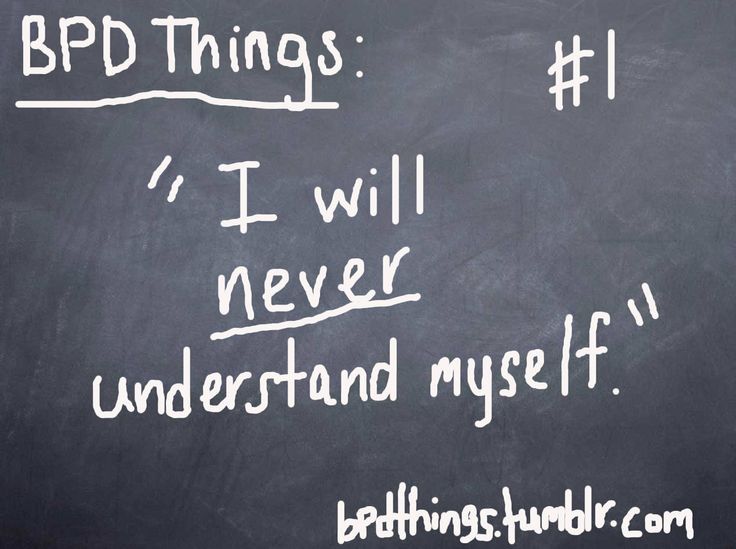 In the first place is always the clinical picture, that is, manifestations of mental disorders.
In the first place is always the clinical picture, that is, manifestations of mental disorders.
There is an interesting story about borderline personality disorder in Russia. We still use the International Classification of Diseases of the 10th revision, where in fact there is no such diagnosis, which means that for a long time it was out of sight of psychiatrists. But the absence of a diagnosis in the classification does not mean the absence of violations, because more than 30 years have passed since the adoption of the ICD-10 - it was adopted by WHO in 1990 - and the understanding of mental disorders during this period has noticeably changed.
Now many modern doctors are guided by other criteria when making a diagnosis. They are most clearly formulated in the American classification of psychiatric disorders DSM-5. Similar criteria are used in ICD-11, which is adopted by WHO and should come into force in Russia in 2024.
Listed above are nine criteria that are specific to BPD.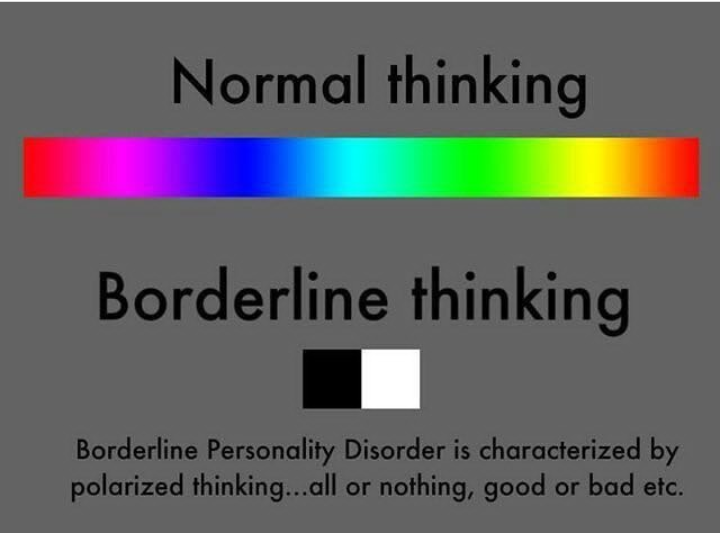 The task of the psychiatrist is to identify them during a conversation with the patient. The basis for the diagnosis of "borderline personality disorder" is the presence of at least five of the nine criteria. nine0021
The task of the psychiatrist is to identify them during a conversation with the patient. The basis for the diagnosis of "borderline personality disorder" is the presence of at least five of the nine criteria. nine0021
How I was correctly diagnosed and treated
After many unsuccessful attempts at treatment, I decided to change doctors again and went to a new psychiatrist at another clinic. The first appointment there cost 7,000 R, and repeated appointments cost 6,000 R.
I was corrected for drug treatment. And with the final diagnosis, they rushed between bipolar affective disorder, or BAD, and borderline personality disorder.
/bipolyarnoe-rasstroystvo/
How much does it cost to treat bipolar affective disorder
They are similar in symptoms. BAD also occurs with alternating periods of depression and high spirits, but they are usually long and can last several months.
In BPD, periods of different moods change over several hours, less often over several days, that is, the mood is constantly unstable. Moreover, these two disorders can occur simultaneously in one person.
Moreover, these two disorders can occur simultaneously in one person.
As a result, the psychiatrist diagnosed me with borderline personality disorder. Now, once every one and a half to two months, I go to him to monitor the condition. nine0021
From the same time, I began to go to schema therapy - this is a therapy focused on making a person change their behavior patterns. I go to a psychotherapist every week, one session costs 6000 R. I feel that it helps me.
BPD - MSD Handbook
My maladaptive patterns of behavior that my therapist and I identified at our first meeting. In the lower left corner are the schemes to be achieved It is difficult to treat BPD. My doctors never know in what condition I will come to them and whether I will come at all. Meetings are held online from time to time. I am often late, I call specialists from different places: it can be a park or my workplace, a stop on the street or someone else's apartment, a noisy highway or a food court. Sometimes I don't want to see my doctor because it seems that he is wrong about everything. nine0021
Sometimes I don't want to see my doctor because it seems that he is wrong about everything. nine0021
I used to feel disgusted and decided that I needed another doctor: I abruptly go from idealizing a person to hating him. For this reason, many doctors refuse patients with borderline disorder. In addition, people with BPD tend to discount their own problems, so many may not seek help for a long time.
/list/antidepressant-facts/
10 things to know before taking antidepressants
Over the years, I have developed several rules for choosing a doctor for myself:
- At the reception, they listen to me attentively.
- Everything that I consider important is important to a doctor. He should not wave his hand and say that there is no point in talking about something.
- The doctor speaks honestly about the diagnosis, does not hide anything, describes the treatment regimens.
- I am informed about the drug I will be taking.
 They explain exactly how it works, why it was prescribed, what side effects.
They explain exactly how it works, why it was prescribed, what side effects. - If I don't like something, I change doctors.
Unfortunately, no rules can help fight mood swings. I try to turn to the facts at such moments and tell the doctors how I feel. Psychiatrists, as a rule, treat the frequent change of doctor normally. I have never faced condemnation. nine0021 One of the latest treatment regimens My prescriptions for drugs, there are a lot of them due to different dosages
How borderline personality disorder is treated
Alexey Pribytkov
psychotherapist, psychiatrist, PhD
The main method of treating borderline personality disorder is psychotherapy. It is necessary to achieve a stable result. Medications only alleviate some of the symptoms of the disorder.
Dialectical Behavioral Therapy, or DBT, has the most evidence of effectiveness in treating BPD. Other directions can be applied: schema therapy, transference focused therapy - TFP. nine0021
nine0021
However, medications are also prescribed for most BPD patients. Three groups of drugs are usually used:
- Mood stabilizers, or mood stabilizers, are drugs that smooth out emotional fluctuations and help maintain an even mood.
- Antidepressants - they help to reduce the severity of emotional instability. BPD often accompanies depressive and anxiety disorders, obsessive-compulsive disorder - antidepressants are also used to treat them. nine0004
- Antipsychotics, or second-generation antipsychotics, are prescribed in low doses to correct impulsivity and aggression.
The choice of treatment regimen depends on the symptoms of the individual patient. Drug therapy usually lasts at least a year, more often several years.
How do I deal with borderline personality disorder
Insomnia. I have suffered from sleep problems since childhood. I tried everything: from hot milk at night to being very tired during the day. nine0021
nine0021
Unfortunately, I do not have a universal solution to this problem. I only save myself with pills: psychiatrists prescribed tranquilizers for sleep, now I have an antidepressant with a strong sedative effect - or I just don’t sleep.
/insomnia/
How to deal with insomnia
Anxiety and panic attacks. It often overtakes unexpectedly and at the most calm moments. Just talking to a friend, I can start twitching my leg, nervously breaking my nails, scratching my skin with my nails, or sticking to my phone. This is also manifested by a rapid heartbeat, trembling in the body, a desire to move, and strong fear. nine0021
To get rid of this feeling, I knit, switch to TV series, listen to meditation practices, start moving more, turn to metaphorical associative cards or Tarot. Metaphorical associative cards are cards with pictures that you can interpret based on your experience.
I use cards when my anxiety is about the future. I am extremely afraid of uncertainty, and this is a chance to decide at least a little, albeit somewhat irrational.
I am extremely afraid of uncertainty, and this is a chance to decide at least a little, albeit somewhat irrational.
Feeling alone and abandoned. Feels like an unfilled hole in the chest. At such moments, I am sure that I have no one to turn to, no one will help. The feeling that I am alone in the whole world.
Saves background noise such as a movie or TV series. I also have three cats that periodically ask for attention, and I am no longer alone. During periods when I feel very lonely, my friends help, who, if they cannot come, then at least call or write.
Sometimes, in order to feel that I am not alone, I look for meetings with different men. I tend to dive into the person who gives me attention, as if I'm trying to close the inner "hole". If I don’t get enough attention, then I show aggression, and subsequently I change the “victim”. I'm trying to deal with this with the help of psychotherapy. nine0021
Mood swings, anger and aggression. In an hour I can experience a huge range of emotions, it is very tiring. Moreover, anything can become a trigger: an incorrect statement on the part of the interlocutor, just an action that seemed wrong to me, or an opinion that is the opposite of mine. I can be aggressive even to banal questions about my well-being.
In an hour I can experience a huge range of emotions, it is very tiring. Moreover, anything can become a trigger: an incorrect statement on the part of the interlocutor, just an action that seemed wrong to me, or an opinion that is the opposite of mine. I can be aggressive even to banal questions about my well-being.
I try to warn people about the peculiarities of my behavior, I leave the dialogue if I feel that I am jumping into aggression, I try to distract myself. My psychotherapist advises to live through aggression and give it a way out: tear a sheet of paper, go in for sports, beat a pillow, shout. nine0021
/list/psychotherapevt/
10 important questions for psychotherapist Sergey Divisenko
Changes in interests, hobbies and desires. I don't have one hobby, they are constantly changing. I can't say what my favorite movie or music is. Because today I like one thing, and tomorrow I'm already interested in absolutely polar things.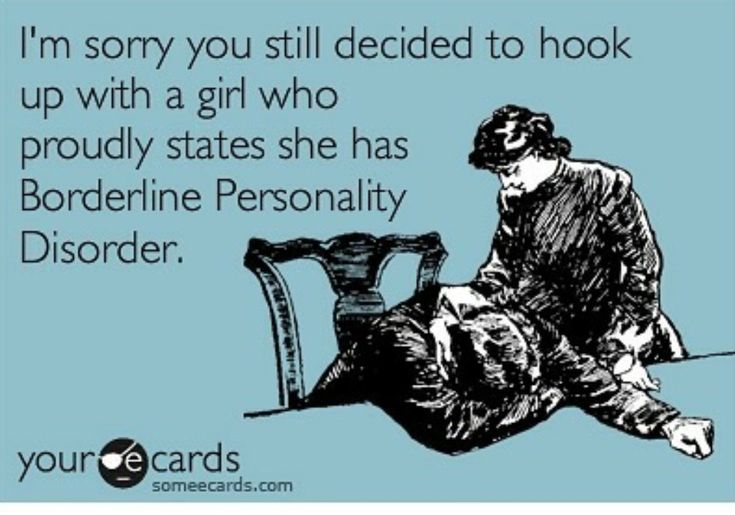 I never know in advance what awaits me the next day.
I never know in advance what awaits me the next day.
Suicidal thoughts and destructive behavior. For the first time I thought about suicide at the age of 14. Then these thoughts haunted me throughout my life. Somehow I lived with a gas leak in my apartment for several months, knowing full well about it. I drown my negative emotions in alcohol. I used to cut myself, but then I replaced this ritual with getting tattoos on my body. nine0021
Such thoughts are difficult to deal with. Medication, mindfulness and constant support from a psychotherapist help a little. I also sometimes go outside in the cold or take a shower: it's sobering.
Unstable self-esteem. I need a permanent evaluation from the outside. I doubt whether I am doing the right job, whether I look right if I do not receive feedback from people. Every mistake is a tragedy for me, but from praise I can feel capable of anything. I can spend weeks thinking that I did some wrong action, although it did not suffer consequences. nine0021
nine0021
To cope with this, I try to compliment myself, remind myself what I'm doing and why, and look at the results of my work. This does not always work, but here you need to take small steps and learn to focus on your feelings, and not just on others.
11 types of psychotherapy that work
Communication difficulties. I'm thrown from love to hate. I often conflict and change because of this place of work. In no relationship have I lasted more than a few months, and communication with friends is reduced to a couple of meetings a year. If I feel that I may be rejected or denied something, then I do it first to avoid emotions. nine0021
Everything that happens is always a disaster: vivid emotions, strong feelings of guilt. If I feel like I'm getting less attention, I'm hysterical. I immediately feel abandoned and abandoned. Considering my peculiarities of behavior, I always try to warn friends and relatives about my condition and tell how not to run into even more negativity.
How to better communicate with people who have borderline disorder
Like many people with BPD, the SET-UP method works well for me. There is about him in the book “I hate you, just don’t leave me. Borderline Personalities and How to Understand Them by Kreisman and Strauss. nine0021
6 useful services for finding a psychotherapist
SET stands for support, empathy, truth - support, sympathy, truth.
It is important that none of the parts can be thrown out of this communication triangle, otherwise the person with BPD will go into conflict or stop communication altogether:
- Support should be expressed in the form of concern in the first person: “I worry about how you are you feel." The main thing is to express your own feelings and sensations. nine0004
- Sympathy: "You must be feeling upset." It is important to validate the feelings of the person with BPD. Don't try to show pity or talk about how you feel the same way.
 Most likely, this is not the case. And the phrase "I know how bad you feel" will only cause ridicule and anger.
Most likely, this is not the case. And the phrase "I know how bad you feel" will only cause ridicule and anger. - True: you need to rely on the facts about the situation and not go into accusation. For example: “You quit, you have enough money for a couple of months. I can help by preparing your resume, and you will look for a new job.” nine0004
UP is understanding, perseverance, or understanding and perseverance. These are goals that both participants must achieve.
A person with BPD must become aware of the causes of his actions and their consequences. Understand that he influences his life and can change it. He needs perseverance in order not to give up treatment, because any changes are difficult.
For those close to a person with BPD, understanding is the recognition of a person's feelings and emotions. That is, the acceptance that negative statements and aggression are behavioral features. They need perseverance in order to continue communicating with a person with borderline disorder, not to stop reminding him of his readiness to help, to sober him up and help him find the true cause of events, rely on facts, and not let him focus only on emotions. nine0021
nine0021
/shizofreniya/
How much does it cost to support a relative with a mental disorder
Communication with a person with BPD is always stressful, so people around need to take more care of themselves. It will take a lot of patience and strength to withstand sudden mood swings and maintain relationships.
The main thing is to understand that it is not your fault and you cannot influence BPD. However, if you remain in a stable state and support a person with a disorder, he will eventually cease to see his relatives as a potential threat, which means that there will be fewer outbreaks of aggression. nine0021
There is a resource center "Borderline Personality Disorder" in Russia. It is designed for Muscovites, but on the site you can find personal stories of people with BPD, literature on the topic and features of this disorder.
How much does it cost to treat borderline personality disorder? The psychotherapist told me that we would manage in a year.

You need to visit a psychotherapist every week, an appointment costs 6,000 R. In addition, every one and a half to two months I visit a psychiatrist, whose appointment also costs 6,000 R.
/prl/
How much does borderline personality disorder treatment cost? Since I have severe depressive episodes, I need to take pills for a long time: from the moment my condition becomes stable on the background of psychotherapy, it is another 6-12 months.
Now about 2000 R per month is spent on drugs. I often change pills, so the cost is approximate. nine0021
Drug treatment can remove symptoms that interfere with a normal life, and with the help of a course of psychotherapy, it will be possible to go into remission and significantly improve the quality of life. Relapses are extremely rare and are associated with affective states.
I spend 372,000 R per year for the treatment of borderline disorder
| Treatment | Expenses |
|---|---|
| Weekly psychotherapist visits | 312 000 R |
| Psychiatrist visit every 2 months | 36 000 R |
| Medicines | 24 000 R |
Visit of a psychotherapist every week
312 000 R
Visit a psychiatrist once every 2 months
36 000 R
24 000 R
is it possible to cure a borderline personality disorder
Alekgersiye. 0021
0021
psychotherapist, psychiatrist, MD
We cannot completely eliminate the symptoms of borderline personality disorder. However, its manifestations can be smoothed out: pronounced negative traits can be corrected, some stability achieved, and social adaptation improved.
At the same time, the essence of personality cannot be changed, the characteristics of a person are preserved. In fact, the task of treatment is not to completely eliminate these features, but to teach a person to live with them, to clearly understand and manage them. nine0021
Remember
- Borderline personality disorder is characterized by unstable mood, fluctuations in self-esteem, dependency on the opinions of others, and an acute fear of being alone.
- The risk of developing BPD is increased by genetic factors, stress and violence in childhood, and poor attitude towards the child by significant adults.
- Borderline personality disorder is usually treated with psychotherapy, but medications may also be needed to relieve some of the symptoms and make life easier.

